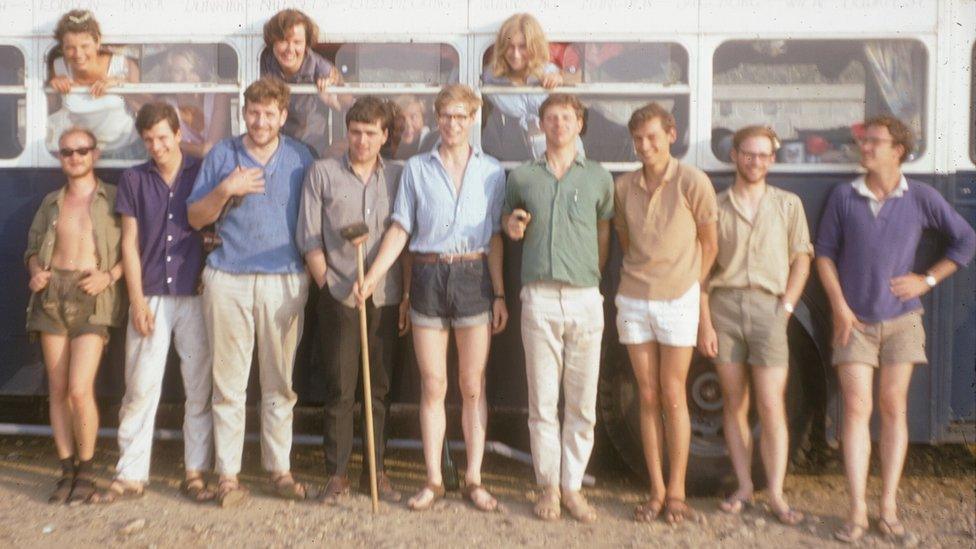Your stories: The Great British Grand Tour
- Published
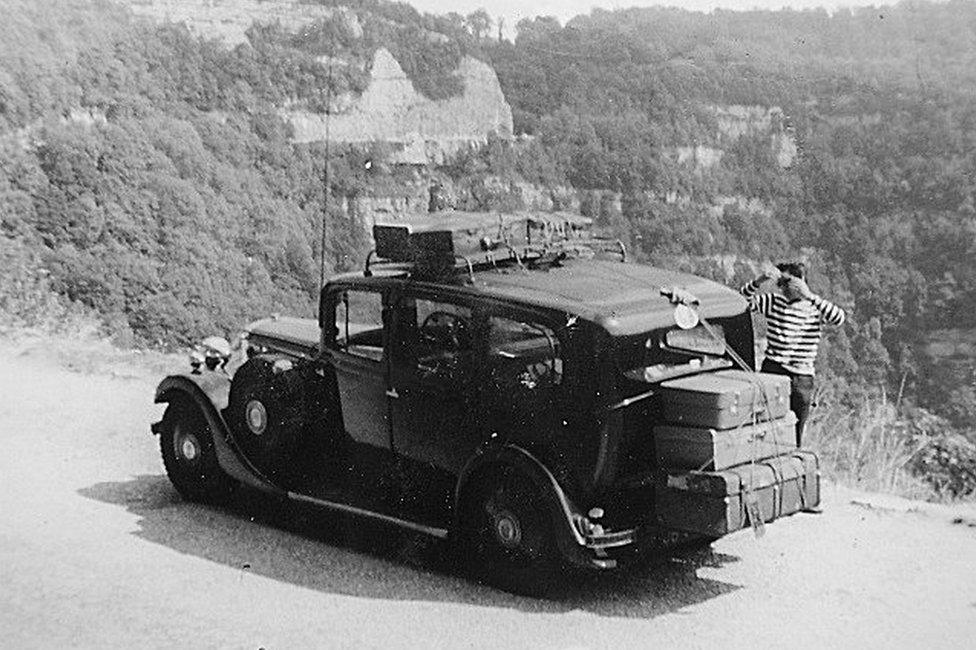
This Daimler was 'sold' to Tony Reason and his friends for just a shilling
Our story about a group of friends who travelled to Eastern Europe on a double-decker bus really got people reminiscing. In 1968, Wendy Scott, who now lives in Newcastle, and her friend Ian Jack from Cambridge, were students at St Andrew's University when they embarked on a summer holiday they will never forget. Their story prompted a flurry of emails from people telling us about their own adventures in an assortment of unlikely vehicles. Here are a few of them:
Europe, Asia and India in a Commer ex-army truck with gun turret
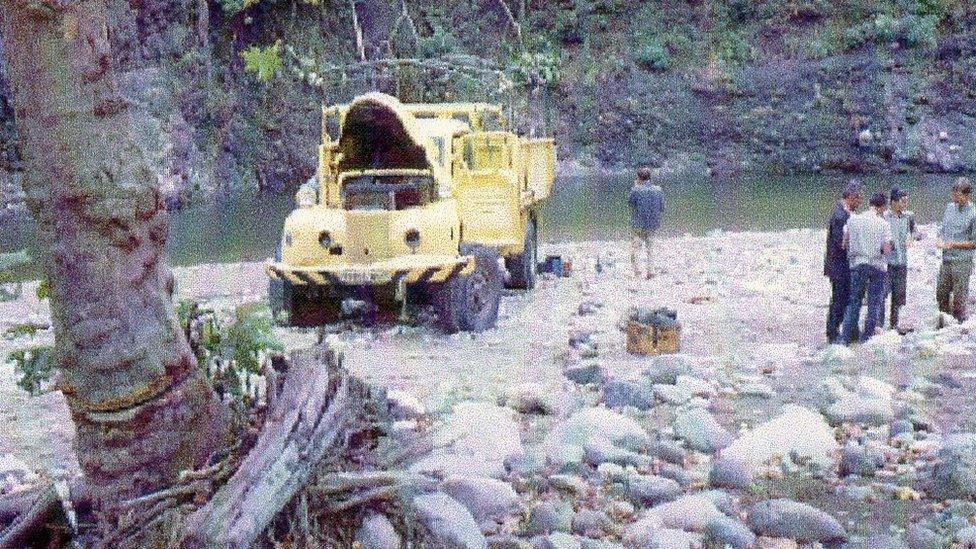
The rescued Commer with gun turret hidden from view
Proving that it is, indeed, a small world, Alan Barnes and his friends remember meeting Wendy and Ian and the rest of the double-decker contingent in Bulgaria.
"Tate & Lyle sponsored us with tins of syrup which we traded with Ian, Dave and company," he says.
Alan and nine other students from Southgate Technical College had bought a Commer ex-army truck, complete with gun turret, for £99 and set off on an adventure.
One day, near Turkey's Black Sea coast, they took a fateful detour on a single track road through the mountains. "It was about three in the morning and our driver missed a bend in the road and we crashed over the mountain side into a river about 50ft below," says Alan.
"Several of us were injured, spending days in the primitive local cottage hospital and then living in a doss house."
Help was solicited from a nearby US military base but the soldiers were unable to reach the truck, which was still lying where it had landed. Some local fisherman had more success with their winches and the gang managed to get the truck up, repaired and mobile.
But then they had a problem. "If we left it in Turkey, it would have been classed as an import and incurred import duty," Alan remembers. "We had no alternative than to drive it to the Iranian border and leave it in No Man's Land."

To Rome in a 1935 Daimler limousine
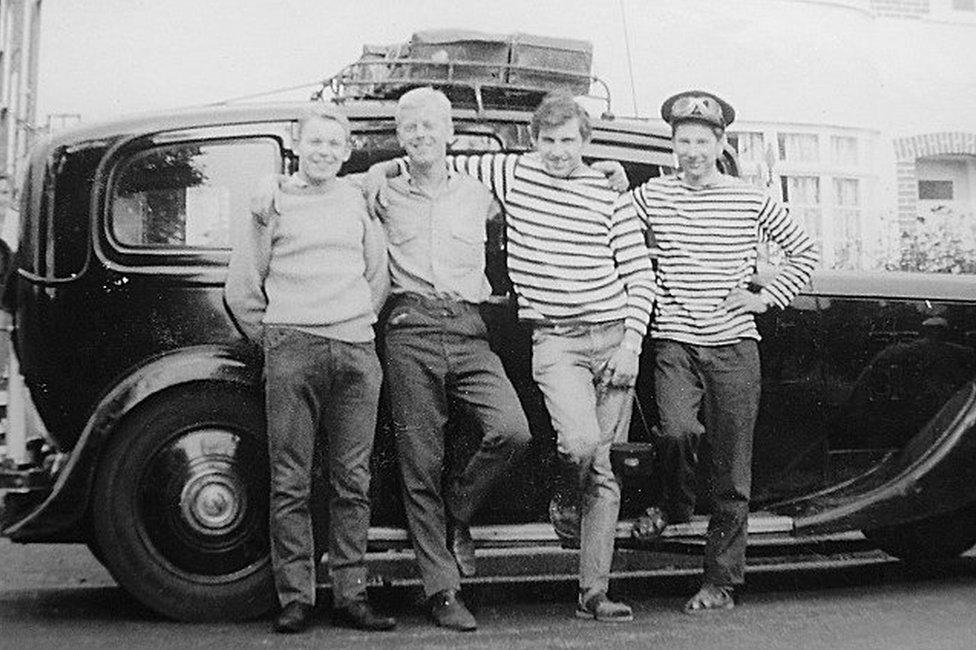
The friends discovered Daimlers were considered to be funeral cars in 1960s Italy
In 1964 Tony Reason and his four friends were having car trouble in the UK when a local doctor "took pity" on them and sold them a 1935 3.5 litre Daimler limousine for one shilling. Why one shilling? To cover the postage stamp on the receipt, external.
Three of them were engineering apprentices and therefore capable of making sure the car was fit for a planned trip to Rome. Though they still found themselves having to drive with the bonnet propped up and the radiator cap off when it overheated on the mountainous St Bernard Pass in France.
"Needless to say, it attracted a lot of attention en route, not always favourable as it was regarded in Italy as a funeral car," says Tony.
"Some left notes of admiration on the car whilst others actually turned their backs as we drove through some small villages."

Varna, Bulgaria, in a rental van
Paul Hampton's trip in a Godfrey Davis rentavan to Varna in Bulgaria on the Black Sea coast was more the product of misplaced enthusiasm in a new job than youthful wanderlust. His company was going to an international conference but its exhibit got lost in transit somewhere in Bulgaria.
Paul remembers optimistically suggesting there was still plenty of time to take a replacement by road. "I knew instantly that I had made the error of volunteering," he says.
"Problems arose at the crossing between what was then Yugoslavia and Bulgaria. I got into a perfect Catch 22," he says. "Outgoing Yugoslav customs wouldn't sign the papers until I had permission to enter Bulgaria. Inbound Bulgarian customs wouldn't let me in until I had been signed out by Yugoslav customs."
He went back and forth between the customs posts until eventually challenged by "a large and impressive Bulgarian officer with lots of red and gold braid" who asked what's going on. Finding out Paul was English he rather disconcertingly announced: "I like the English! I killed many English people in the war!"
Waving away the paperwork with a dismissive expletive, he told Paul he could go. "I give you permission. You just go!" he declared.
Paul also remembers leaving a tap gently running overnight in a hotel to stop beetles crawling out of the sink plug hole and discovering, the next morning, he had used up all their water. A slightly more upmarket hotel in Varna, "built to attract 'decadent' western tourists", had bidets in the bathrooms "but screwed to the floor the wrong way round, with the tap connections unconnected, sticking out into the room", he says.

Moscow in another double-decker bus
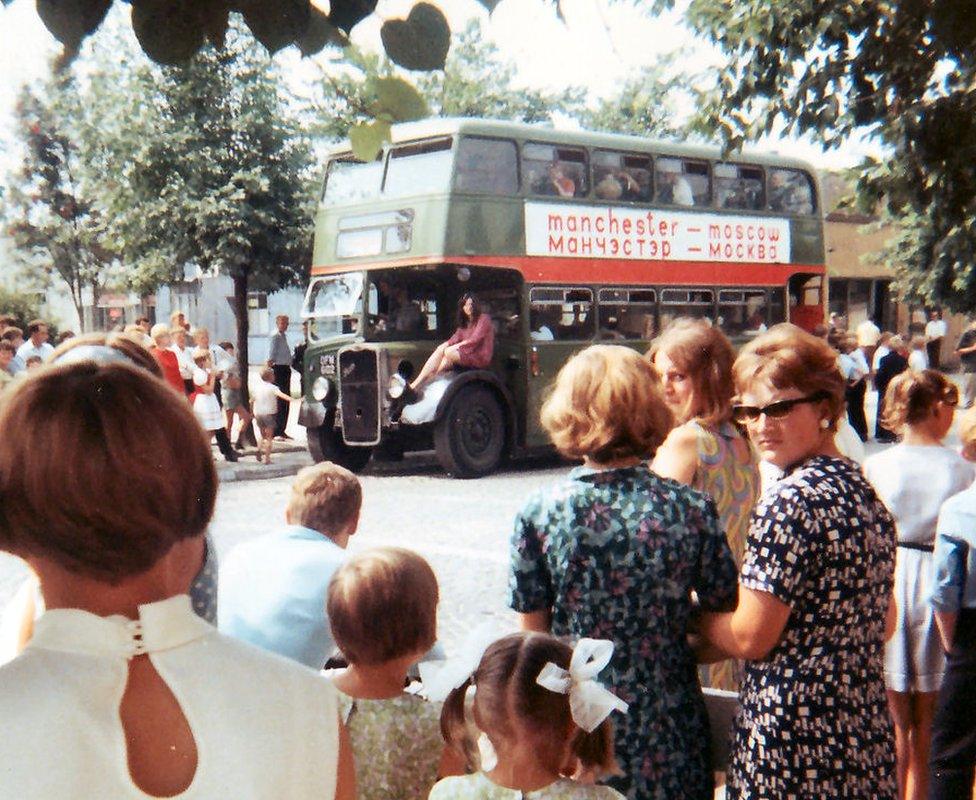
Tony Clark remembers the particularly '60s-style clothes
Tony Clark later emigrated to Ontario in Canada, but in July 1967, he was one of a group of students from Manchester who went to Moscow in a Welsh double-decker with "Peace and Friendship" painted on the side in Russian.
He remembers visiting West German bars with "very strong vodka", drinking Russian coffee with condensed milk and eating donated Vesta curries. Sergei, their courier, kept them "on the desired path" in Moscow but tourism appeared quite relaxed, he says.
The famous GUM department store "was like a huge market hall, quite ornate, as was, and is, the Moscow subway", he says. Traffic was "fast and furious", he says. And you "jaywalk at your peril".
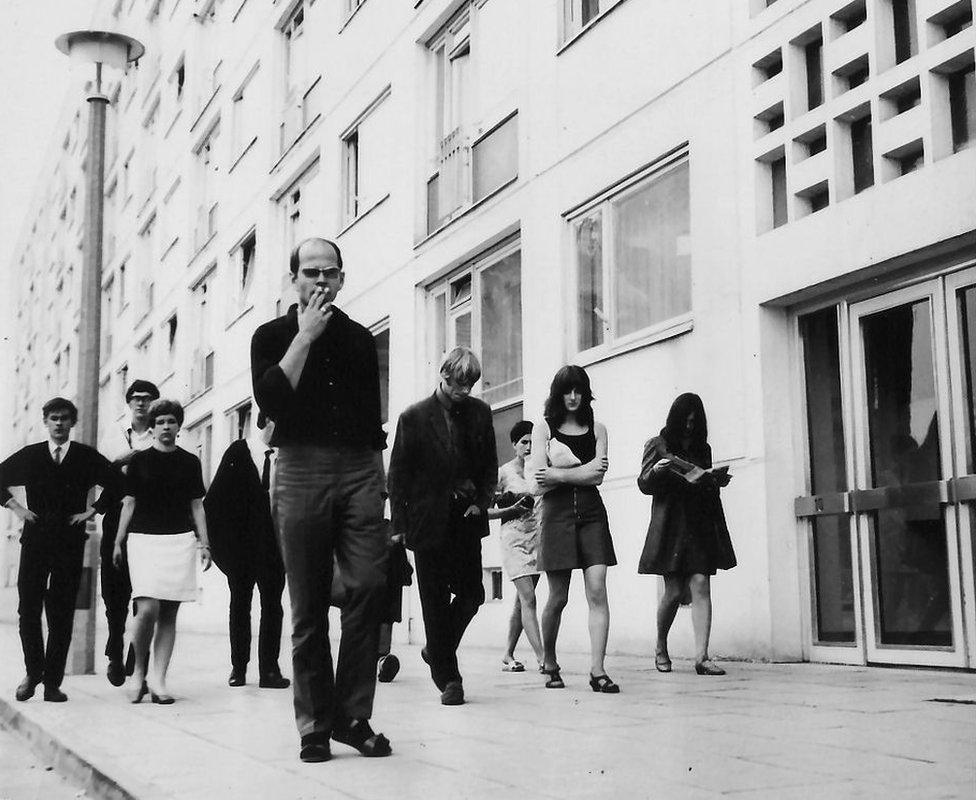
Surely this should be the opening shot of a film - or an album cover?
The bus "nearly became permanently wedged under a rural bridge in the Czech Republic despite route planning beforehand", Tony says. "Only adroit unloading and risky tyre deflation saved the day, with some roof ventilator damage to show for it."

Australia via Singapore in a Range Rover
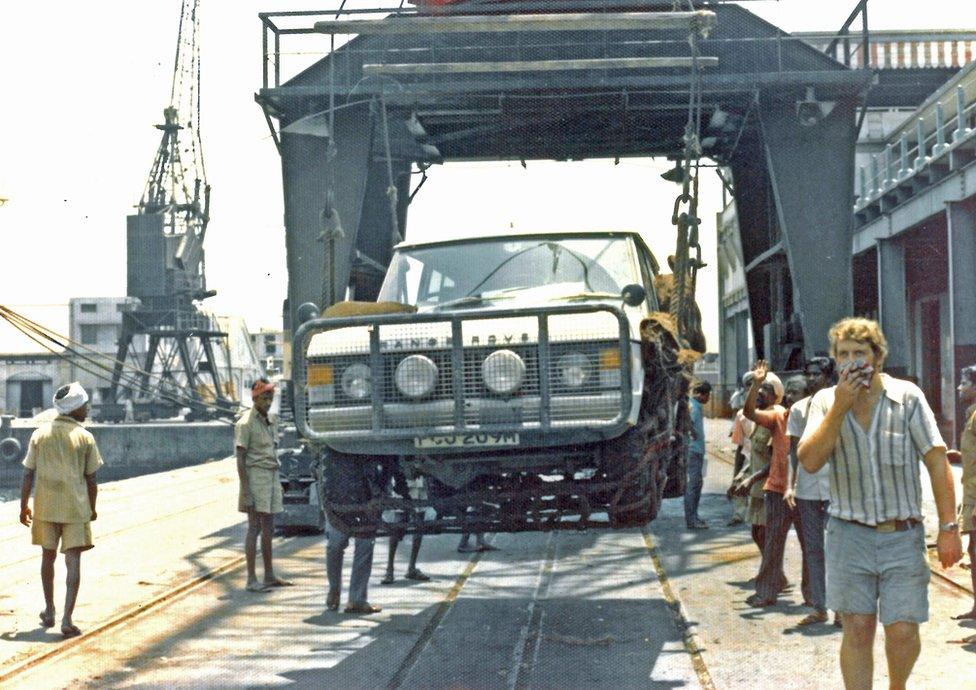
Since they could not drive through Burma (now Myanmar) they had to go from Madras (now Chennai) to Malaya (now Malaysia) by sea
In 1975 Nicholas Laing's Australian friend bought a Range Rover and the pair decided to drive it home, rather than ship it.
They took four cases of whisky with them and reached the border of Iraq with no idea the content of their boot might pose a problem. "There were no maps, no guidebooks," he says. "There was nothing you could read up about in advance of going to any of these countries."
"We were sitting in Beirut wondering how we could get across Iraq because that was the obvious straight line," he says. "Someone introduced us to someone else who knew Iraq and said if you've got whisky in the back of your car you can't go through. You'll have to get rid of it."
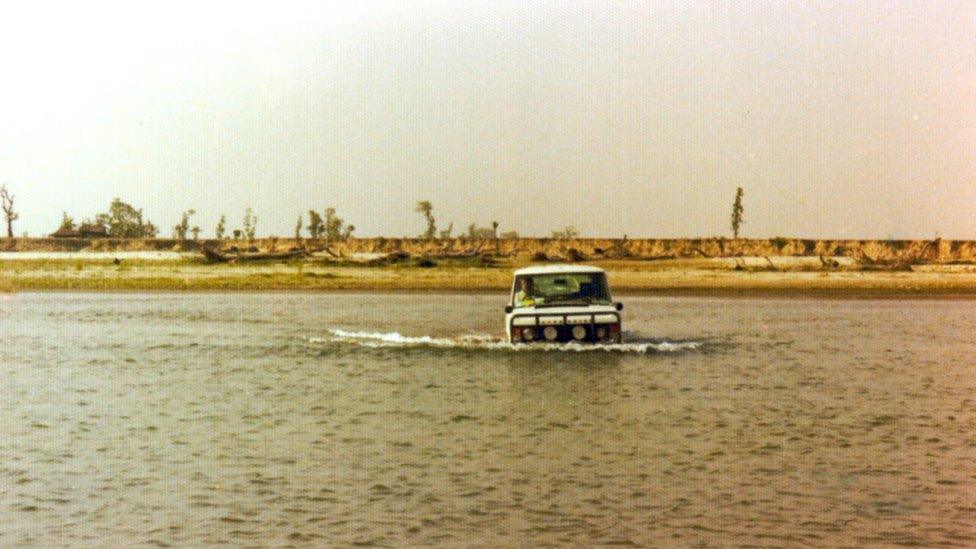
An appropriate choice of vehicle for crossing a river in Nepal
The alternative - a 500-mile detour via Turkey - was the "on the spot decision taken by 22-year-olds who obviously had alcohol at the forefront of their thoughts".
The whisky "opened all sorts of doors", Nicholas remembers, especially in areas where alcohol was prohibited. "Bottles distributed here and there found us beds, amusing company and more adventures."

From Spittalfield to Europe
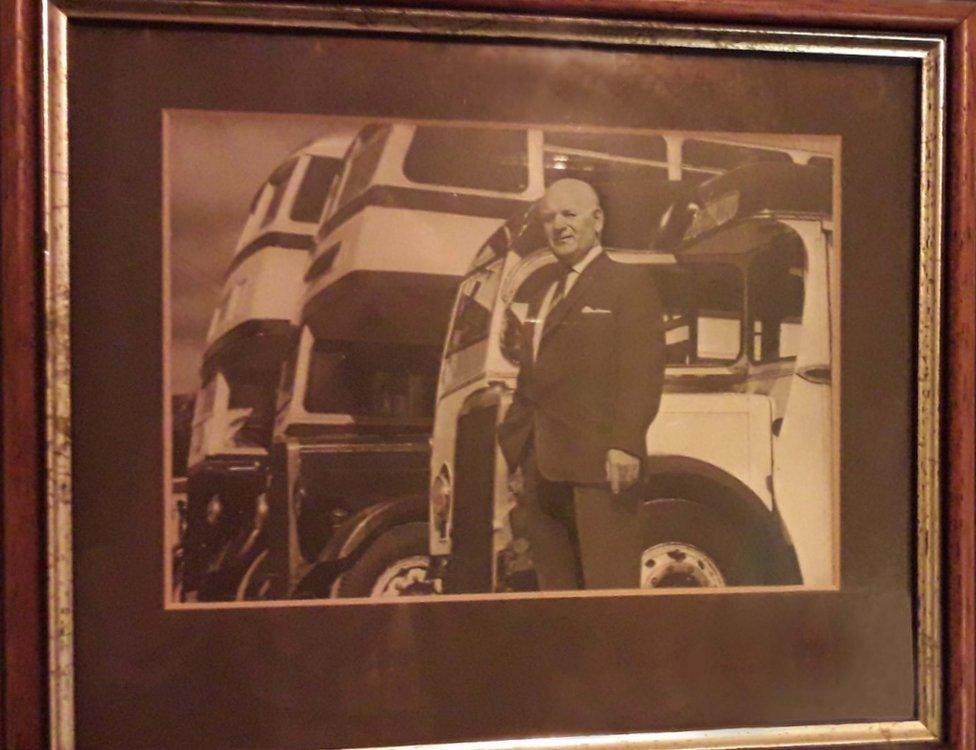
Greg McLennan Arnot has this picture of his grandfather, Alexander McLennan, on his wall
The gang in our original story had bought their bus from a garage in Spittalfield, near Perth in Scotland, which turned out to be Vicki and Gregor Arnot's grandfather's business - A&C McLennan's.
Alexander 'Sandy' McLennan had grown up very poor, Vicki remembers. "Poverty and hunger obviously fuelled his desire to make money and I believe the 60s were a good time for self made businessmen," she says. He bought his first two buses from his boss before designing his own and then buying a car sales garage.
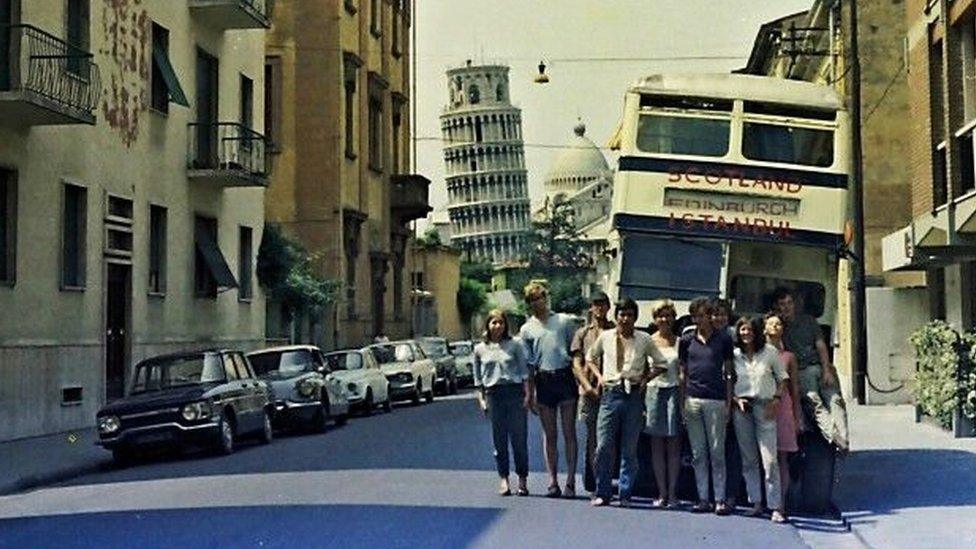
The bus Wendy, Ian and co took from Scotland to Pisa
But the story Gregor remembers - even though this happened before he was born - involves Sandy dropping sweets out of a Cessna light aircraft he used to fly as a hobby.
"Can you imagine how magical that must have been for little ones?" he says.
"The first year they tried to drop them over Wildwood in Stanley but, the gardens being a pretty small target, the sweets went all over the place, to the delight of kids in the nearby park.
"Can't imagine health and safety allowing that kind of thing now."

Romania on a caving expedition
Eve and Chris Gilmore now live in Glasgow but, in 1968, they found themselves stuck behind the Iron Curtain in the middle of Operation Danube.
"The first we knew of the Czech uprising were armed soldiers who insisted we could not leave our campsite," Eve says.
As members of Bristol University's Speleological Society they were on a joint university caving expedition to Romania, which was allowed to carry on for a few days "with the soldiers' permission". They soon decided to leave, though. This involved 19-year-old Eve taking a train by herself across East and West Europe during the Czech Revolution to get back to the UK in time to leave again on a second trip to volunteer in Ghana. Everyone else got home in a second hand lorry.
"No luxurious bus for us I am afraid," she says.

Follow BBC North East & Cumbria on Twitter, external, Facebook, external and Instagram, external. Send your story ideas to northeastandcumbria@bbc.co.uk, external.
- Published8 October 2020
